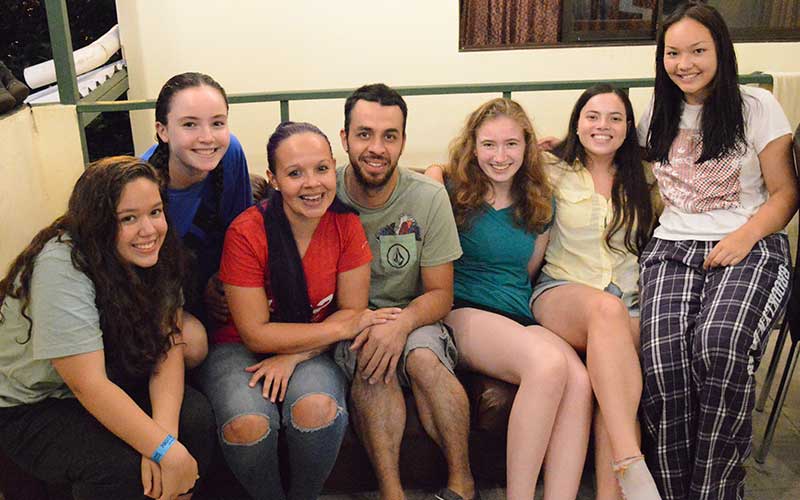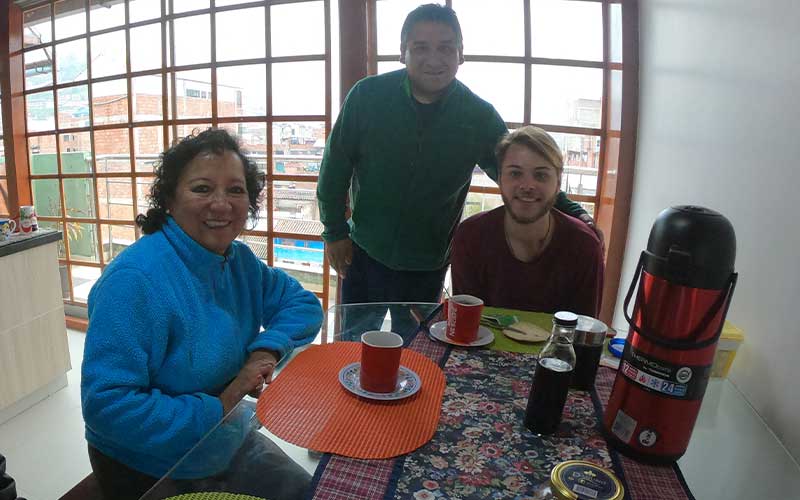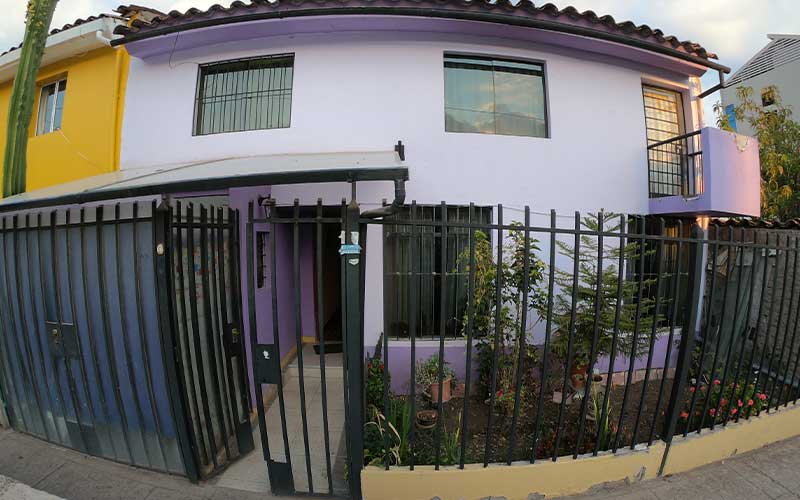At Maximo Nivel we understand that choosing to study abroad can be a big decision. Whether it’s one week, one month, or one year, we want to make sure you have the most positive experience possible which includes living accommodations that add a dynamic perspective of cultural immersion.
Our local families go through a thorough approval process before being accepted to host. Most stays are middle to upper class households that have been partnering with us for several years, and live no more than a 15-20 minute commute from campus. You might share a room with other international participants of the same age and gender, but private rooms are also available. Regardless of your accommodation, you can be sure you’ll receive a comfortable bed, hot showers, WiFi, and tremendous improvement of your Spanish language skills! You’re free to come and go as you please, but immersion means respecting the household rules of a host-family.
Though we encourage all of our participants, and especially participants looking to improve their Spanish, to choose a home-stay, don’t take it from us. Read on to learn of real experiences our international guests had with their host-families while volunteering, interning, and studying abroad.

Devin K. – Antigua, Guatemala
The experience of volunteering abroad in Guatemala was meant to knock me off my feet, so I wanted to have as many new experiences as possible, and that included a host-stay. I wasn’t at all sure what to expect, but when I arrived, my sweet house mom gave me a full tour and showed me to my private room. It consisted of a twin size bed, a small desk and a closet perfect for my short stay.
She informed me that I wasn’t the only volunteer she was hosting, and later on I met other volunteers like myself. It was really cool to get to know everyone, learn about their backgrounds, what brought them to Guatemala, and why they chose a volunteer abroad experience. I guess you find a tribe when you do something that’s true to you because all of the volunteers at the house had so much in common. We were all eager to put our best foot forward and excited for the new adventures that awaited us.
I think the excitement got to our host family as well as even they began pitching ideas and giving us more insight into the culture to determine if certain events would be successful or not. Staying with a host family, and meeting such like minded people, was a highlight of my trip. I still keep in contact with them all- including my host family!

Tia L. – San Jose, Costa Rica & Cusco, Peru
I volunteered with Maximo Nivel on two separate occasions; I completed a construction project in Costa Rica and an animal care project in Peru. Certainly, there were differences, but regardless, one of my favorite experiences at both was living with a host-family.
Being welcomed and cared for by a host family is what really gave me insight into the daily lives of the local people and helped to bridge any gaps that may have been fostered without their kindness and compassion. It was with open arms (literally) that I met family members who lived inside and outside of the home, and spent time getting to know the people who made my stay so memorable. It was amazing to be part of their culture and family, even if only for a short time, as it was the greatest learning experience of all
Not only did they open their homes to me, but they introduced me to the local flavor of the country. In Costa Rica, I gorged on traditional rice and beans. I don’t eat it often back home, so it was one of my favorites, and my host mom was happy to cook it! She also did her best to make me feel welcomed by preparing some North American favorite. My host mom in Peru would often make a delicious vegan broccoli soup that tasted like a classic broccoli cheddar soup! I also really loved the fried plantains.
Without having had these great experiences, I would never have met the wonderful people I am honored to call my hosts families and the amazing friends I met at the institute.

Kyle F. – San Jose, Costa Rica
Since I knew I’d be volunteering in San Jose, I wanted to feel like I lived there, too. That’s how I ended up staying with a sweet couple a short bus ride from the Maximo Nivel institute in Costa Rica. I was able to take a bus to and from my volunteer placement which made me feel like a true local.
After a long day of work, I’d ride the bus back and find that a delicious dinner was always ready. Myself and Alex, the husband, would talk endlessly about construction work and how some building techniques are different from back home, while Marta and her daughter chatted about their own interests, as their granddaughter ran around with the dog.
As simple as my nights were, I really appreciated them. Dinners with my own family only happen during holidays since we all live so far away from one another, so being surrounded by family was truly special.
Rebeca S. – Antigua, Guatemala & Cusco, Peru
I volunteered twice with Maximo Nivel; the first time in Guatemala and the second time in Peru. Both times, I chose to stay with a host family which added to the volunteer abroad experience in both countries. My host-stay experience in Guatemala felt like a college dorm room with 5 girls. It made it easy to connect with others, learn from one another, and helpful for those who wanted to practice their Spanish. Our host mom had no issues accommodating her meals to my vegetarian lifestyle and for the first time, I was able to experience Guatemala’s delicious beans with a Salvadoran spin to them.
When I decided to volunteer for the second time in Peru, my host stay was a bit different. I actually got to travel and volunteer with a dear friend of mine, so we were placed together and shared a room with two separate beds. Our host mom always prepared a delicious bean and potato soup that kept us warm during the Cusquenan winter nights.

Grayson M. – Antigua, Guatemala
One of the biggest contributing factors to my language improvement during my time studying abroad was my experience with a host family.
I lived with the Acevado family in the Northwestern corner of Antigua. The house had connected buildings, one for the main house and one for the family’s business. There was a beautiful terrace where I could study and have a 360-degree view of the mountains and volcanoes. In the house, there would be 5-8 people at breakfast and dinner. Each meal became a great opportunity to speak Spanish, as my host mother did not speak English.
My host mother, Anna Lilian, made wonderful soups and many different dishes. I was surprised by the yummy breakfast drinks and enjoyed having fresh bread and vegetables with each meal. My favorite dish was certainly the chicken pepián! The spices and herbs were so delicious. I had a lot of amazing food that I can’t get in my home state of Alabama.
In my room, there were two girls from Canada, and I became very close friends with them during my time in Antigua. I was able to meet people my age from other countries and made friends that I could study with during my Immersion program. I miss them all dearly and already want to plan another trip!

Genevieve J. – Chinchero, Peru
When I chose the Andean immersion project in Peru, I was inevitably choosing a host family. You won’t find any hotels or hostels in the remote parts of Peru, so I was placed in very modest dwellings with a family part of a traditional Andean village. I’ve never learned so much.
My family demonstrated the importance of developing significant relationships that go way beyond the shallow interactions that often take place today. Not only was it expected that I acknowledge everyone in the village, spoke with them in passing, and learned their names and roles in the community, but it was also important that I developed a relationship with the land and living beings that were providing for us.
The experience stayed with me long after my time with my host-family ended. I learned that everyone has something to teach you, maybe even about yourself, and that having morals and values really sets the foundation for who you are and want to become. Though I’m not sure I will see any of them again, I’m truly grateful for the experience and all the lessons learned.

Stacey D. – Cusco, Peru
Honestly, I learned 100% more Spanish by staying with a host family than I would have learned otherwise. Google translate, reporting back to my Spanish teacher, and bringing home vocab was so much fun. They made me feel like part of the family, and I often hung out with Karen- my host-sister – and her friends. Luckily, she spoke some English, but she forced me to speak as much Spanish as possible.
The food was always delicious and I was excited to try new dishes. I’m not really a picky eater so I had no issues there. I had my own private room and felt comfortable for my entire stay.
Pierre M. – Antigua, Guatemala
Living in the country and with a host family, exposed me to daily life as a local. I learned about cultural values (their ability to be happy with much less than we have in Canada), their religious beliefs, and traditional food staples such as Pepian chicken and tamales. Being exposed to the language also greatly improved my Spanish speaking skills. In Guatemala, I opted for the Spanish immersion courses which really helped me to advance.

Jingying C. – Cusco, Peru
After meeting the staff at the campus, I was taken to my host family; they were fantastic, kind and extremely welcoming. My host dad (who is basically fluent in English) helped me to improve my Spanish through game nights and fun interactions. The family always included the volunteers in their activities – like when their sons had school performances in Cusco’s month-long festivities, we went to show our support. On Fathers’ Day, they invited us to their relatives’ house for breakfast and we met all the “tios”, “tias” and “abuelos”! I always felt at home.
Staying with a host family was the best cultural immersion experience. You don’t have to be shy asking questions if you’re curious about something culturally. In fact, it is highly encouraged since this is your best chance to learn.

Amber G. – Manuel Antonio, Costa Rica
I prepared for my trip by studying a bit of the most common Spanish idioms on my own. I even purchased a Spanish/English dictionary and downloaded the Google translate app. I chose to stay with a host family to get the full Spanish immersion experience, and I was so grateful to have been able to share the house with 2 other female Maximo participants. These girls really helped me to adjust to the new environment, and to communicate more effectively with our wonderful host mom.
As the days wore on, I deleted the Google translate app because I felt that it took away from feeling present. In fact, it made me feel even more obligated to learn the language fully through Spanish immersion; I wanted to be able to have a conversation with my host family as a sign of respect for their culture. There was a level of expectation I felt learning Spanish in Costa Rica because I knew it would bring me closer to being part of the community.



